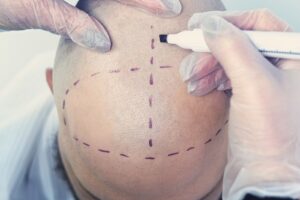Hair loss is a complex condition that can be influenced by many factors, with genetics playing one of the most significant roles. For many individuals, hair loss is predetermined by their genetic makeup, making it crucial to understand how heredity affects hair health and what personalized treatments are available to address this issue. This post will explore the genetic factors behind hair loss and the personalized approaches to treatment that can help you maintain a healthy head of hair.
The Genetics of Hair Loss
What Are Genetic Factors in Hair Loss?
The most common form of hair loss related to genetics is androgenetic alopecia, which affects both men and women. This condition is often referred to as male-pattern baldness in men and female-pattern baldness in women. The pattern of hair loss varies between genders but is often progressive and permanent.
Genetic hair loss is inherited, meaning if your parents or close relatives experienced hair thinning or baldness, you are more likely to develop the condition. However, the exact inheritance pattern can vary, and several genes may be involved.
Male-Pattern Baldness
In men, androgenetic alopecia is most commonly associated with male-pattern baldness, which typically begins with a receding hairline and thinning at the crown. This form of hair loss is linked to the sensitivity of hair follicles to dihydrotestosterone (DHT), a hormone derived from testosterone. Men with a genetic predisposition to hair loss tend to have higher levels of DHT or increased sensitivity to it, leading to the gradual miniaturization of hair follicles.
Female-Pattern Baldness
For women, genetic hair loss usually manifests as female-pattern baldness, characterized by diffuse thinning across the top of the scalp. Unlike men, women generally do not experience a receding hairline. The exact cause is less understood than in men, but it is believed that hormonal fluctuations, particularly after menopause, combined with a genetic predisposition, contribute to this condition.
Inherited Genes and Hair Loss
What Genes Are Linked to Hair Loss?
Several genes play a role in determining hair loss patterns, and genetic research continues to uncover more about the mechanisms involved. Some key genetic factors include:
- The AR Gene (Androgen Receptor Gene): This gene regulates how the body responds to androgens, including DHT. Variations in the AR gene are strongly linked to male-pattern baldness. Men who inherit specific variants of this gene are more likely to experience early-onset hair loss.
- Polygenic Inheritance: Hair loss is not caused by a single gene but is considered polygenic, meaning multiple genes contribute to the likelihood of developing androgenetic alopecia. This is why hair loss patterns and severity can vary even among siblings.
- X-Chromosome Inheritance: Some studies suggest that genetic hair loss may be passed down through the X-chromosome, which men inherit from their mothers. This means that men might inherit their susceptibility to baldness from their maternal grandfathers, but other factors can influence this pattern.
Are Women Affected Differently?
Although male-pattern baldness is more widely studied, women also inherit genes that influence hair loss. The genetic component in women is more complex, as factors such as hormonal changes (e.g., menopause) can heavily influence the expression of these genes. Unlike in men, where hair loss often results from heightened sensitivity to DHT, women’s hair loss is often linked to a broader range of genetic and hormonal factors.
Personalized Treatment Plans Based on Genetic Factors
Why Personalized Treatment Plans Are Important
Given that genetic hair loss is influenced by multiple factors, a one-size-fits-all treatment approach is unlikely to be effective. Personalized treatment plans, tailored to your unique genetic makeup, offer the best chance of success in slowing or reversing hair loss. By understanding your specific genetic predispositions, medical professionals can develop targeted strategies that address the underlying causes of your hair loss.
Genetic Testing for Hair Loss
One of the most advanced tools in creating personalized treatment plans for hair loss is genetic testing. Genetic tests can provide insight into the specific genes responsible for your hair loss, your body’s sensitivity to DHT, and your overall risk of developing androgenetic alopecia.
Several companies offer at-home genetic tests for hair loss, which require a simple cheek swab to analyze your DNA. The results can help medical professionals determine which treatments are most likely to be effective for you.
Personalized Medications and Topical Treatments
Based on your genetic profile, certain medications and topical treatments can be prescribed to slow the progression of hair loss or even stimulate new hair growth.
- DHT Blockers: If genetic testing reveals that you are sensitive to DHT, medications like finasteride (Propecia) may be recommended. Finasteride works by inhibiting the enzyme responsible for converting testosterone into DHT, reducing the amount of DHT in the scalp and slowing hair loss.
- Minoxidil: This topical treatment is commonly used for both men and women to promote hair regrowth. Minoxidil is available over the counter, but higher-strength formulas may be prescribed based on your specific needs.
- Hormone Therapy for Women: Women with hormonal imbalances contributing to hair loss may benefit from hormone therapy. This can include oral contraceptives or anti-androgens like spironolactone, which block the effects of DHT on the hair follicles.
Hair Transplantation
For individuals with significant genetic hair loss, hair transplantation may be a viable option. Hair transplantation involves moving hair follicles from areas of the scalp where hair is still growing (often the back and sides) to areas experiencing thinning or baldness.
Modern techniques like follicular unit extraction (FUE) and follicular unit transplantation (FUT) ensure natural-looking results, with minimal downtime. Genetic factors play a role in determining how well hair transplants will take and the longevity of the results.
Low-Level Laser Therapy (LLLT)
Another treatment option that may be part of a personalized plan is low-level laser therapy (LLLT). This non-invasive treatment uses light to stimulate hair follicles and promote regrowth. It has been shown to be effective in individuals with genetic hair loss, particularly when combined with other treatments.
The Future of Genetic Hair Loss Treatment
Advancements in Gene Therapy
As genetic research continues to evolve, there is growing interest in using gene therapy to treat hair loss. Scientists are investigating ways to modify or “edit” the genes responsible for androgenetic alopecia, potentially offering a permanent solution for individuals with a genetic predisposition to hair loss.
Stem Cell Research
Stem cell research is another promising avenue for treating genetic hair loss. By harnessing the regenerative power of stem cells, scientists aim to create new hair follicles or rejuvenate dormant ones, offering hope for individuals with advanced hair loss.
Conclusion
Genetics play a major role in determining whether or not you will experience hair loss. But, thanks to advancements in medical science, there are now personalized treatments available to address the root causes of your condition. Whether through genetic testing, medications, or cutting-edge therapies like hair transplantation and LLLT, tailored treatment plans offer the best chance of slowing or reversing hair loss.
Contact Eldorado for Personalized Hair Restoration Plans in Baltimore
If you are struggling with genetic hair loss and are looking for a personalized treatment plan, Eldorado in Baltimore is here to help. Offering a range of hair replacement and restoration services, including hair transplants, laser therapy, and customized treatments based on your unique needs, Eldorado can help you regain confidence and a full head of hair. Contact Eldorado today to book a free hair analysis and start your journey toward healthier, fuller hair.





